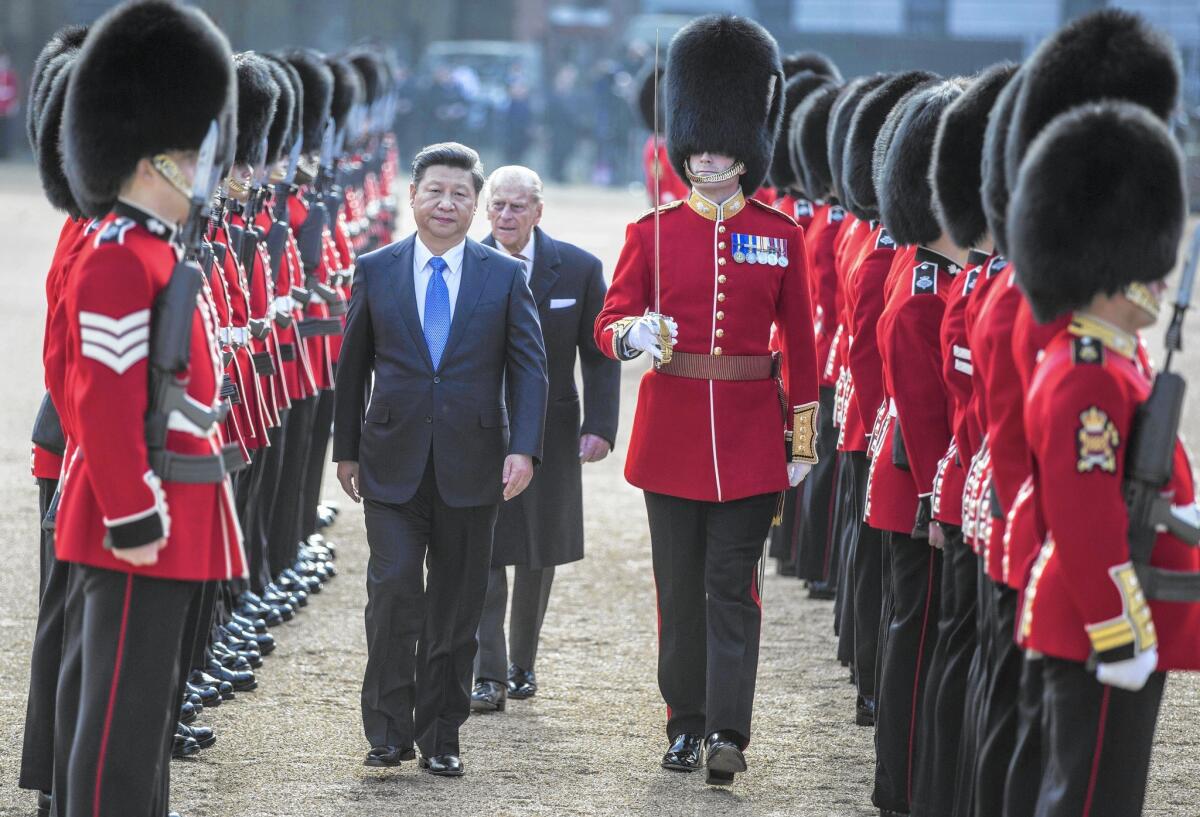Britain welcomes China’s Xi Jinping despite protests and Prince Charles’ early exit

Chinese President Xi Jinping and Britain’s Prince Philip inspect an honor guard in London. “It is fair to say that China and the UK are increasingly interdependent and becoming a community of shared interests,” Xi said later.
- Share via
Reporting from LONDON — Britain on Tuesday greeted Chinese President Xi Jinping with a lavish display of pomp and pageantry that included a 41-gun salute, a ride in a gold horse-drawn carriage and a white-tie banquet hosted by Queen Elizabeth II at Buckingham Palace.
Much like the Communist Party leader’s September visit to the U.S., his four-day state trip to Britain was sure to send a powerful message to China about his political clout abroad. But Xi, head of an emerging superpower with the world’s second-largest economy and a human rights record that has raised concerns, also drew protests.
A few hundred demonstrators from the activist group Free Tibet and the human rights organization Amnesty International vehemently voiced their opposition to the way Xi was welcomed with open arms. They waved placards and flags as they lined the Mall, where he made the short journey from his first welcome ceremony at the Horse Guards Parade ground to the palace.
They were, however, at times drowned out by an even larger number of pro-China supporters with huge Chinese flags and drums, and scuffles reportedly broke out.
The visit came as more job losses in the British steel industry were announced Tuesday, with cheap imports from China being blamed as one of the causes.
More than $45 billion in trade and investment deals are expected to be made during the coming days, and Prime Minister David Cameron vowed to raise the steel issue with Xi during one of several meetings planned for the two leaders.
The visit was broadcast extensively on television and there was speculation in the media that the presence of so many Xi supporters, many of them young Chinese nationals studying at British universities, had been aided by the Chinese Embassy in an effort to ensure Xi received a warm welcome.
Foreign Secretary Philip Hammond said tough conversations about human rights issues would not be sacrificed to secure lucrative business deals with China.
“We see huge opportunities to protect British jobs and secure British prosperity through working with the Chinese,” he said. “The more engaged we are with each other, the more opportunity there is to have a genuine discussion about these things, a frank discussion.... We will certainly take the opportunity to raise issues which will be uncomfortable with our Chinese partners during this visit.”
When Xi was escorted to Buckingham Palace in the gold horse-drawn carriage, he was accompanied by the queen and an interpreter. They were part of a procession made up of the Household Cavalry, numbering several hundred soldiers, and later viewed the Royal Collection’s Chinese artifacts at the palace.
There was also the customary exchange of gifts: a collection of Shakespeare sonnets from the monarch and two albums of folk music recorded by Xi’s wife, Peng Liyuan, a well-known singer.
Later in the afternoon, Xi gave a speech to both houses of Parliament and said he was “deeply impressed” by the vitality of relations between the two countries.
“It is fair to say that China and the UK are increasingly interdependent and becoming a community of shared interests,” Xi said during an 11-minute speech at the Royal Gallery in Westminster.
“Since the founding of new China in 1949, our two countries have led the way in a number of areas in terms of bilateral relations,” he said, and there was a “long shared deep mutual affection.”
He also met with Prince Charles and his wife, Camilla, the Duchess of Cornwall. The atmosphere was said to be friendly, but the heir to the British throne did not attend the evening’s white-tie banquet, where Xi was the queen’s guest of honor.
Palace officials said Charles would have several opportunities to meet with Xi privately, but some viewed his absence as a snub. The prince has long expressed his support for the Dalai Lama, the exiled Tibetan spiritual leader.
Xi also had a one-on-one meeting with Jeremy Corbyn, leader of the opposition Labor Party. The session was described as “cordial and constructive” by party officials.
The pinnacle of the long day of diplomacy was undoubtedly the white-tie banquet in the palace ballroom attended by 170 guests, including politicians and Prince William and his wife, Catherine, the Duchess of Cambridge.
A roasted loin of venison from the queen’s Balmoral estate in Scotland was on the menu.
As anti- and pro-China demonstrations continued to chant slogans outside the palace gates, the queen gave a speech celebrating the “sincerity and warmth” of the friendship between China and Britain.
She spoke of the strong connections that bind the two nations together culturally, educationally and economically.
“The relationship between the UK and China is now truly a global partnership,” the monarch said.
Boyle is a special correspondent.
More to Read
Sign up for Essential California
The most important California stories and recommendations in your inbox every morning.
You may occasionally receive promotional content from the Los Angeles Times.










